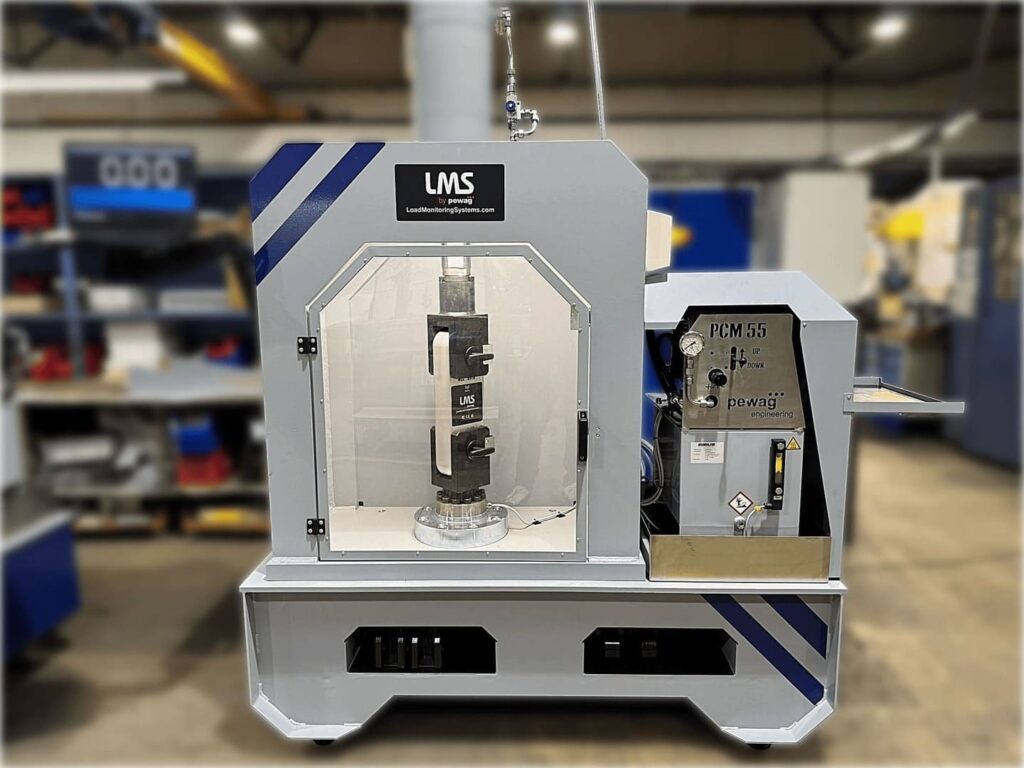Accurate loads. Safer operations. Longer equipment life.
When it comes to load monitoring, calibration isn’t just a technical box to tick, it’s a critical safety and compliance measure that impacts everything from freight billing to offshore lifting operations.
At LMS, we offer expert calibration and repair services across a wide range of sectors including offshore, subsea, renewables, military, agriculture and aquaculture, supported by advanced calibration setups in the UK and globally.
What is calibration and why is it essential?
In simple terms, calibration is the process of “tuning” your load monitoring equipment to measure loads within the capacity at its most accurate. Using high-capacity test beds, our team applies known reference loads to train devices to provide accurate readings.
This process ensures:
- Devices are measuring true load weights
- Equipment meets industry compliance standards
- Operational safety and structural integrity are maintained
From shipping docks that bill by the tonne to offshore rigs managing high-stakes lifts, accurate calibration ensures every reading is reliable and every job is performed safely.
What are the risks of skipping calibration?
Skipping regular service calibration puts your entire operation at risk. Inaccurate readings can potentially:
- Lead to safety incidents
- Cause equipment failures
- Result in over (or under) billing
- Have a knock-on effect to other systems relying on precise load data
In regulated industries, failing to calibrate may breach compliance standards, especially when structural or safety loads are involved.
LMS calibration and repair service capabilities
As trusted calibration equipment suppliers, the calibration facilities at our UK headquarters includes unmatched test bed capacity including:
- A 2000te test bed – the largest dedicated to load cells in the area
- 2 x 55te, 150te, 500te test beds
- Equipment certified to the highest standards
Whether it’s A-frame testing, winch pull testing, bollard tests, or Vessel thruster checks – we’ve got the setup to ensure your equipment is field-ready, safe, and accurate.
In addition, LMS is expanding its international calibration network to provide customers with local access to high-precision load cell calibration. Previously, calibration was only available in the UK, resulting in higher transport costs and extended operational downtime for international clients.
The deployment of 55te calibration machines globally will provide customers with local access to high-precision calibration services, ensuring:
- Lower transport costs
- Reduced operational downtime
- Fast and accurate calibrations
With a load cell capacity from 3.25t to 55t, the machine delivers accurate results fast.
How often should load calibration be carried out?
Industry standard recommends calibration every 12 months. This frequency gives customers confidence in:
- Ongoing accuracy
- Compliance with industry regulations
- Safe, stress-tested equipment
We’ve built robust internal procedures to ensure every system is certified, maintained, and returned to customers in optimal condition.
What sets LMS apart?
Beyond advanced calibration services, LMS is known for:
- Exceptional customer service and turnaround times
- Experienced technical support and advice
- Trusted in-house experts with decades of cross-sector load monitoring knowledge
- Responsive, reliable calibration service from trained professionals
- High quality range of load monitoring products
Whether you’re a new customer or a returning client, you’ll always deal with real experts who can solve problems, recommend improvements, and keep your equipment working better, for longer.
Need your load cells calibrated or serviced?
Get in touch to speak with our expert team or visit our repair and calibration services page to learn more and book your next calibration.

